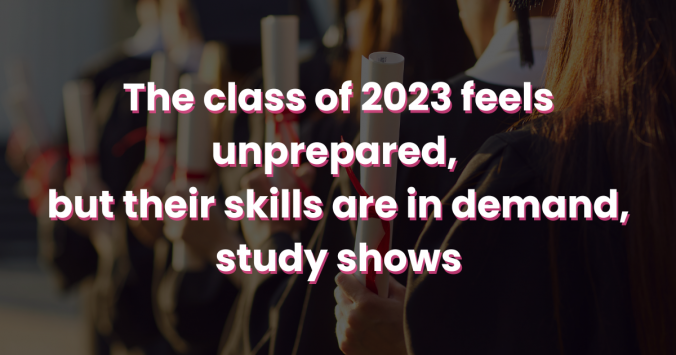After spending a large portion of their academic journey learning remotely, the class of 2023 feels largely unprepared to enter a rapidly changing work force, according to a new survey. But research suggests graduates may be in better shape than they realize.
While there are economic forces to contend with such as inflation and a high cost of living, the job market for new graduates remains relatively strong. Despite missing out on some traditional work experiences during the pandemic, many bring distinct skills and experiences that are valued by employers.
According to a yet-to-be-published survey by TalentEgg, a career resource provider dedicated to Canadian students and recent graduates, 77 per cent of new graduates are worried about inflation and 54 per cent fear a looming recession.
“They’re also feeling somewhat unprepared for the workplace, which doesn’t surprise me,” says TalentEgg chief executive officer CEO Mary Barroll. “After three isolating years of working and studying remotely, students and grads have had less opportunity to have experiences in the workplace that [aren’t] remote.”
According to the survey, 80 per cent of new graduates felt they needed additional training to enter the work force; 89 per cent believe they need better presentation and communication skills and 73 per cent feel they need more conflict resolution training.
Despite valid concerns over a worsening economy and a lack of in-person work experience, Ms. Barroll says entry-level workers remain in high demand in most sectors of the economy.
“We’re seen a big increase in employers wanting to work with us recently, which means they have more jobs that they’re trying to fill,” she says. “Across the board most of our employer clients – and they are typically big enterprise clients who are looking to build a pipeline of young talent – are actively hiring students and grads.”
Furthermore, Ms. Barroll suggests that though the pandemic weakened some of their social skills it also equipped new graduates with other employable traits.
“Students would be well advised to remember how resilient and adaptable they’ve proven themselves to be,” she says. “They can use those lessons in resilience and adaptability to navigate a changing world, and they should take pride in the fact that they’ve done so well under such difficult circumstances.”
According to a recent survey of employers by Brainstorm Strategy Group, adaptability and resilience rank fifth on employers list of the skills they most want to see in student and recent graduate job candidates. The most desired trait by employers of entry-level staff is communication skills.
Brainstorm’s president Graham Donald says employers often complain of a lack of work force preparedness among entry-level workers, but suggests the problem might be more pronounced among the graduating class of 2023.
“Employers and the school advisory members are saying the same thing; that because of the pandemic students are pretty good at working virtually, but they are really not well equipped to come into the workplace,” he says.
Mr. Donald says students typically graduate with some in-person work experience, either from summer jobs, co-op placements or part time work, but says it’s become harder for employers to find entry-level staff who are comfortable navigating an office environment. He advises recent graduates to be present in the office, suggesting that in-person connections are particularly important to this cohort.
“If the opportunity is there, go as much as you can,” he says. “That’s how [career] opportunities open up, because people don’t build the same relationships virtually, there’s just no comparison.”
Mr. Donald says networking is especially hard for young people, as they have less of a network to build on. He suggests starting by reaching out to fellow alumni to request a few minutes of their time.
“If you call a graduate from your program, they will most certainly say they will be happy to talk to you,” he says. “Never ask them if they have a job for you; ask them about their career, how they got there and about their career path.”
Developing those communication, networking, and other soft skills, according to new research from LinkedIn, may even prove more valuable to graduates than their actual degree.
“Your educational institution, and your degree, while important, is no longer something that directly places you in front of an employer,” says Riva Gold, the senior news editor of LinkedIn Canada. “Increasingly employers are looking beyond your degree to your skills, and that means they’re also looking to widen their candidate pool.”
According to Ms. Gold recent graduates can pursue opportunities in most industries regardless of their educational background, so long as they can demonstrate the necessary skills.
“You need to be adaptable, and forward looking, and nimble, and ready to pivot, rather than investing in a specific career ladder, just because of what you studied,” she says. “A learning mindset has always been important for career starters, but as the specific skills needed to do particular jobs change really rapidly, employers are increasingly focusing not just on the technical skill set you have at the moment, but your demonstrated ability to learn and apply new skills to get results.”
JARED LINDZON
SPECIAL TO THE GLOBE AND MAIL
Be sure to check out all the TalentEgg editorials dedicated to student and new grad recruitment and success today!
